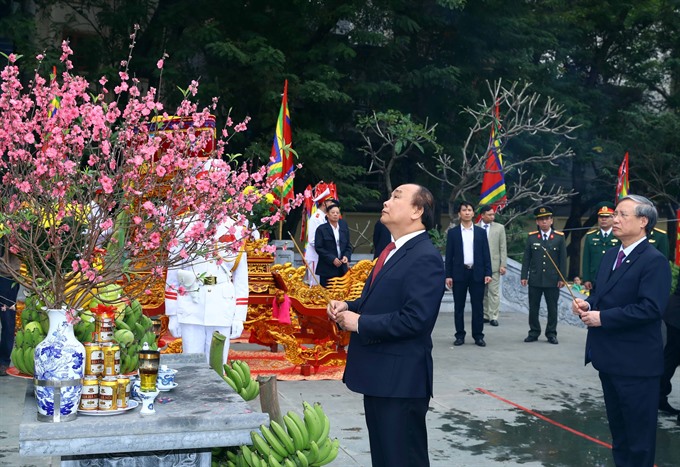 Politics & Law
Politics & Law

Prime Minister Nguyễn Xuân Phúc attended the Đống Đa festival in Hà Nội yesterday, the fifth day of the Lunar New Year, and offered incense in tribute to Emperor Quang Trung, marking the 229th anniversary of Ngọc Hồi–Đống Đa’s victory over the Chinese Qing invaders.
 |
| Prime Minister Nguyễn Xuân Phúc attended the Đống Đa festival in Hà Nội yesterday, the fifth day of the Lunar New Year. — VNA/VNS Photo Thống Nhất |
HÀ NỘI – Prime Minister Nguyễn Xuân Phúc attended the Đống Đa festival in Hà Nội yesterday, the fifth day of the Lunar New Year, and offered incense in tribute to Emperor Quang Trung, marking the 229th anniversary of Ngọc Hồi–Đống Đa’s victory over the Chinese Qing invaders.
The festival also saw the attendance of the Head of the Party Central Committee’s Inspection Commission, Trần Quốc Vượng, Secretary of the city’s Party Committee Hoàng Trung Hải, Vice Chairman of the National Assembly Uông Chu Lưu, along with a large number of visitors from the capital city and other localities.
Addressing the event, Chairman of the People’s Committee of Đống Đa District Võ Nguyên Phong highlighted the significance of the Ngọc Hồi–Đống Đa victory under the leadership of Emperor Quang Trung, also known as Nguyễn Huệ, 229 years ago, during which over 20,000 Qing troops were defeated, liberating the imperial city of Thăng Long and regaining the nation’s independence and freedom.
Since then, the fifth day of the first lunar month has become the traditional day marking the historic victory.
The Ngọc Hồi–Đống Đa victory has also gone down in Vietnamese history as an immortal and epic struggle for the defence of the fatherland.
Đống Đa Mound reportedly witnessed fierce battles between Emperor Quang Trung’s soldiers and the Chinese invaders during the campaign.
The festival is designed to uphold the country’s cultural values while educating younger generations about the tradition of patriotism and national pride.
This year’s festival also included a “Tuồng” classical drama play re-enacting the victory, along with dragon dancing, art performances, and folk games. — VNS




